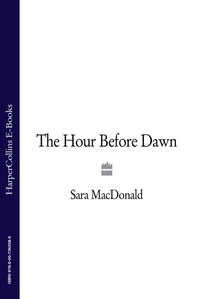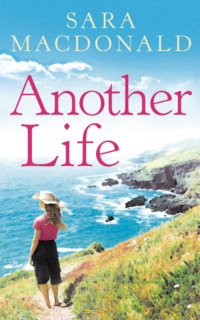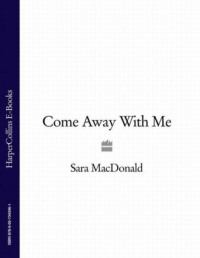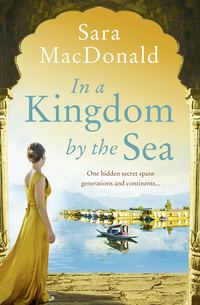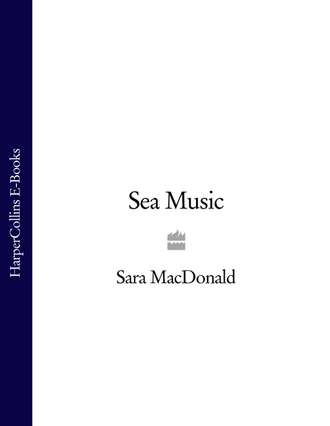
Полная версия
Sea Music
Lucy is still hopping up and down. ‘She is such a totally selfish human being,’ she echoes. ‘Don’t tell me it’s wrong to dislike my own mother sometimes, Barnes. She makes me furious. Does she ever ask you how you are? Does she, hell! Thank God you stood your ground. She’s got such a bloody cheek. Sorry, I’m knackered … Got to go to bed …’ Lucy wilts, suddenly exhausted.
Barnaby kisses her good night. ‘Sleep well,’ he says drily. ‘Having a vicar as an uncle has done nothing to improve your language.’
He watches her walk across the damp grass and disappear through the little gate to the cottage. How could Anna have produced this child he loves so dearly?
The curlews down on the estuary warble mournfully into the darkness. Startling himself, Barnaby admits suddenly that he too can actively dislike his sister. Not only does he wish her in outer Mongolia, but he realises he has always felt like this.
Martha’s memories, so long suppressed and left behind, are beginning to surface slowly and slyly, like bubbles. Time for Martha has become meaningless. Past and present merge and blur. Voices and faces pass like shadows across her mind, throwing up long-forgotten lives. Those lives seem so real to Martha, so near, as if she can open a door and move into the rooms of her past life once more. Those far-gone lives of her childhood draw her back with long tentacle arms, to enfold her in their sense of nearness.
She reaches out to touch the fleeting sleeve of a dress, the rough tweed of a jacket. She smells fresh bread in the oven. She sees faces she loves bending to her, smiling, chiding her wildness. With longing, she lifts her head to feel their breath upon her cheek, turns to catch the sound of faint laughter and the warmth of a hand.
She listens to the wind rattling the long windows so that the sound echoes through the house, shutting doors with a sudden click, moving the curtains outwards, lifting the rug in little tremors, like ghostly footsteps through the hall.
Mama and Papa are having tea with the German doctor and his wife. Marta and Mama and Papa have travelled from Łódź all the way to Warsaw by train to see him. Marta has been sent into the garden with the doctor’s small boy and the nursemaid. The nursemaid is not watching them, she is flirting with the gardener.
Marta stares at the German boy with fascination. He has the whitest blond hair, very blue eyes and white, white teeth. He is wearing lederhosen and a pale shirt, and his bare arms and legs are brown and smooth as apples. He stares back at Marta disdainfully. He does not like to be sent outside to play with a girl.
Marta stands on the terrace steps, wary and a little frightened, like a small rabbit ready for flight. The boy puts his hands on his hips and, coming closer, looks down at her.
‘How old are you?’ he asks.
‘I am five,’ Marta says, trying to make herself tall.
The boy is pleased. ‘Well, I am older, I am eight. Mutti says I am going to be much taller than my father.’ There is a silence. Then he says in a bored voice, ‘Come, I am going to go and see the horses.’
He turns and marches away towards the stables. Marta follows him. She is afraid of horses, but she is not going to say so.
The horses are standing looking out of their stalls, shaking their great heads against the flies. They are groomed to a shiny perfection, their manes shimmer as they toss their heads.
The boy goes to a big stallion. ‘This is Tylicz, My favourite horse. When I am older I will ride him, but at the moment he is too big and strong.’ He takes an apple out of his pocket and turns to Marta. ‘Here, you may feed him if you like. Give this to Tylicz.’
He is watching her closely and he smiles suddenly. She is growing pale at the thought of approaching that huge mouth. He knows, he knows I am afraid, Marta thinks.
The boy places the apple in her hand and leads her towards Tylicz. Desperately, she tries to hang back, but the boy pulls her sharply forward, tells her there is nothing to be afraid of and lifts her clumsily towards the great head of the horse. Marta screams as his long yellow teeth reach out towards her. She drops the apple and jerks away. The boy loses his balance and lets Marta fall onto the hard stable floor.
He bursts out laughing; he can see she is not hurt and she looks so funny. Marta will not cry. She is angry. She picks herself off the floor, bends and takes the fallen apple, wipes it on the hem of her dress and breaks it into pieces with her teeth. She has remembered something Mama told her and she arranges the pieces on the flat of her hand.
She walks over to Tylicz and, trembling, stands on tiptoe and raises her hand up, up, towards the horse, keeping very still and balancing herself on the door of the stall with her other hand.
Tylicz looks down at her almost as if he is smiling and very slowly and gently he bends over the stable door, craning his neck down to her hand. He can only just reach the apple, only just brush her hand with his whiskery mouth. He tickles her open palm, his mouth velvety, as he scoops the apple up, and Marta laughs as he crunches it noisily.
She cannot stop laughing for the relief of not being bitten and the laughter lights up her face and fills her whole being. She is not afraid of this boy. She is not afraid of the horse.
When she turns round the boy is laughing too, and the look in his eyes is no longer scornful. Marta hears Mama calling and they turn together and run across the green lawn, back towards the house. Marta’s head is held high and her back is stiff with triumph.
The boy’s mother is standing with Mama outside the French windows. She reaches down and ruffles the thick blond hair of the boy. She is pretty, Marta thinks, and golden, but she does not smile. Next to her, Mama looks tiny and far more beautiful, with her shiny dark hair and smiling brown eyes.
The German doctor comes out into the garden with Papa, and bends to Marta. ‘Your father and I are old friends, Marta. We studied together. I hope you and my son will be friends also, because your papa has agreed to come and work with me. He is going to build you a house on that land over there that backs on to the forest. Then, you see, he can help me run my clinic.’
Behind the tall doctor, Marta is watching the boy. He is standing with his hands on his hips, feet apart, staring at her with those pale, intense, turquoise eyes. His mother reaches down and whispers something to him. He pulls away embarrassed, shrugs off her hand, and in a little lightning movement kicks out at a garden chair, which collapses with a clatter on top of a little dog, who gives a great yelp and dashes away.
The boy jumps. Marta does not think he knew the dog was there, but she is not sure. It is time to go. Her father takes her hand. She turns and looks over her shoulder. The boy is standing with his blond hair blowing in the wind, still watching her. He seems suddenly alone and strangely beautiful. Exciting. Marta shivers.
Chapter 5
Lucy wakes early and pulls on a T-shirt and track-suit bottoms.
‘Sorry,’ she says to Homer, as she lets him out into the garden for a pee. ‘I’ll take you out later, but you can’t keep up with me when I’m running.’
Homer looks martyred and slinks back to his bed.
‘Come on, don’t be a drama queen.’ Lucy lifts his heavy old head and plants a kiss on it, but the dog is not to be mollified.
Lucy opens the front door and runs past the church and down the path towards the beach. The air feels warmer, expectant. Birds scuttle about in the undergrowth, flying low and gathering feathers and fluff, grass and twigs. She runs down the steps and jumps onto the sand. The tide has turned and she can just get round the point.
Lucy pushes herself, running steadily, jumping the waves that slide in and pool round her feet. She can feel herself beginning to relax. The beach is deserted, stretching long and colourless in early morning light.
Happiness flares suddenly, a joy in being alive. Lucy increases her speed, her hair flapping rhythmically as she gets into her stride. The lighter mornings always make her wake earlier, but it is not daylight that disturbs her sleep.
She has covered a great length of the beach fast; now she slows down as she feels her legs tiring, measuring the point she wants to reach. She pushes the thought of that small odd birth certificate firmly out of her mind. She will think of Tristan instead. She heads up the beach and collapses near the rocks, sweating and panting. In the distance fishing boats are coming out of the harbour, battling over the bar with the wind against them.
Lucy considers what it will be like to live away from the sea again – not just in London, but wherever it is that Tristan could be posted after Kosovo. She is unsure she can live for too long away from the coast. Worse, if they marry, what if he has another single posting and she is left on her own in some army quarter?
She squints up at the sky. She can hear skylarks in the dunes behind her. She and Tristan have never really discussed marriage; it is an understood thing. Tristan may be a lapsed Catholic, but his parents certainly are not.
Tristan and Lucy are firmly given separate bedrooms when they stay, despite his mother being quite aware that they sleep together. It is not done primly or critically and Tristan’s mother had gently explained that she could not have double standards. Laura, Tristan’s youngest sister, still lives at home and there was no way they could countenance her bringing a boy home and sleeping with him.
Lucy grins. Separate bedrooms were funny. Tristan, bringing her tea in the mornings, borrowed his father’s silk dressing gown and cravat, inked a curly moustache with her eye liner and did appalling Noël Coward impersonations, which sounded more like David Suchet playing Poirot.
Lucy wraps her arms round herself as she cools.
‘Do I end up with a baby every year and a waist the size of a block of flats?’ she asked him.
‘Certainly you do,’ Tristan replied. ‘I have a weakness for waistless women.’ Then, hastily, in case she took fright, ‘Has my mother got fifteen children? Of course not. We will just use the rhythm method. Coitus interruptus.’ Seeing her face, he burst out laughing. ‘Idiot! I’m teasing.’ He picked her up and twirled her round. ‘Anyway, you might throw me over for a fisherman and settle for ever in the place you love most, at the end of the world.’
He was smiling, but his eyes were serious. Tris. She cannot imagine life without him. All this, all she has here, would mean so much less if he was not there.
She gets up and stretches, jumps up and down, loosening her limbs. She starts to run back, slower this time. The outgoing tide has left a line of foamy scum on the wet sand.
Tristan has made her grow up. He does not always say what she wants to hear, but she listens, especially about Anna. Her heart gives that anxious lurch again. Like the moment you wake and know something is wrong. She closes her eyes tight, banishing unease.
Anna sent her a little note in a card, congratulating Lucy on getting the teaching job. It is not the sort of thing Anna usually does. Lucy suspects that Alice, Anna’s clerk, bought it, or Rudi. After the congratulations, Anna wrote, ‘About time you rejoined the civilised world. I think you will find it stimulating. Love, Mum.’
Lucy tossed the card aside crossly, but when she told Tristan, he said carefully, ‘I think you are a bit hard on Anna, Lu. She sent you a card because she was proud of you. It doesn’t matter who bought it.’
‘I’m not hard on her! Anna can never do or say anything that does not have a hidden barb. Not to me, anyway.’
‘Is it possible that she cannot do or say anything that you don’t feel defensive about?’
Lucy was stung. ‘You don’t understand. If I am defensive, it is because all my life she has been critical –’
‘Lu, this is a circular conversation. We are not going to have an argument about the dragon in a wig. You’re right, I don’t know what it feels like to be her daughter. I don’t know what it feels like to have had a working or ambitious mother. I think you are just very different people and it’s a shame you don’t get on. I am sure she is as proud of you under her fiery nostrils as you must be of her.’
Lucy reaches the steps and stops again, the sweat pouring down her face. The bloody thing is she is proud of Anna. She remembers her coming to her school to give a talk on careers, just after Lucy had taken her GCSEs. Anna arrived looking stunning, immaculate. When she started talking you could have heard a pin drop in the hall. Lucy was fascinated. It was like watching someone she did not know. Anna the barrister in full stimulating flow, encouraging debate, challenging assumptions. Anna alive, doing what she was best at. For two hours she had forty girls and thirty boys from a neighbouring school riveted.
Lucy pulls herself up the steps, panting. It was the same day that she told Lucy she was going to marry the German banker. In bed that night in the silent dormitory, Lucy thought: that is why she looked so beautiful, why she was so sparkling. Anna is in love.
Lucy had already decided she wanted to leave school and take her A levels at a sixth-form college. There was no way she was going to go back and stay in a small flat with Anna and her new husband. The thought was gross.
Barnaby was back from Northern Ireland and was staying in the cottage on leave. Lucy rang him and asked if she could go down and live in the cottage and take her A levels in Cornwall.
Barnaby thought she was too young to live in the cottage on her own, and her grandparents were too old to have a seventeen-year-old living with them permanently. Lucy argued that she had been staying in the cottage every holiday of her life and that it was ten steps to Fred and Martha’s front door.
Both her grandparents thought it a wonderful idea. It was the first time Lucy saw Barnaby sad. He was leaving the army and seemed distracted. He took off on his own, went travelling. Lucy thought maybe he wanted to stop being a priest.
When Lucy was about to leave for university he came home. He had applied for a parish in Cornwall to be near Martha and Fred. Martha was not very well, but no one knew what it was then.
Lucy reaches the cottage and bumps into Barnaby coming out of the gate. He bursts out laughing when he sees her. ‘Oh my goodness, look at the state of you! You haven’t got any fat to lose, for heaven’s sake. I came over because Homer was howling his head off.’
‘Homer is a spoilt brat,’ Lucy says, looking sternly down at the dog.
‘Of course he is, he has lived with your grandparents all his life. He only transferred his affections to you because you go for longer walks and do not ration his biscuits. Are you coming over for breakfast or are you working?’
‘I am coming over. Is Gran up? Are you cooking bacon and eggs?’
‘Your gran is having breakfast in bed as usual and I am not cooking bacon and eggs. The logic of you running and then eating a cooked breakfast escapes me.’
‘That is because you are a man,’ Lucy says sweetly. ‘I am on a twelve-to-three today and I need sustenance to get me through.’
‘You might get a boiled egg. Spoilt brat,’ Barnaby says, turning and ducking through the garden gate, trailed by Homer. Lucy grins and goes to ring Tristan.
Chapter 6
The first thing Anna hears as she opens the front door is Maria Callas. ‘Suicidio! In Questi fieri momenti.’ She stands listening, leaning against the door. Evening sun catches the coloured panes and flickers across the hall. She can smell the smoke from one of the small cigars Rudi smokes.
The moment is so perfect, Anna feels reluctant to break it. She goes up the stairs slowly. It has been an especially good day and she is home early. Her flat consists of two floors. The room off the hall at the front of the house she uses as a study or third bedroom. Adjoining it is a tiny breakfast room with a gas ring and small sink. It has French windows on to a tiny terrace garden, which she and Rudi use in summer. On the first floor there is a drawing room, two bedrooms, bathroom and kitchen.
Anna loves this flat. It contains everything she needs. She has lived here a long time and spent a lot of money, but it is now worth four times what she paid.
She pushes the drawing-room door open quietly and watches Rudi for a moment. He is sitting in the leather swivel chair, half turned to the window. The Times is spread over his knees but he is not reading. His head lies back against the chair and his eyes are closed as he listens to the music.
Anna stands quite still looking at him. The way his hair, grey-white, grows just over his ears. The way his face seems always tanned. The way the long fingers of his right hand hang over the arm of the chair. His mouth firm, with tiny vertical lines.
There is something sensual and intimate in watching someone with their guard down, watching the face of someone you love when they think they are alone. Her stomach knots with the strength of this love. It bites suddenly at her being, unnerves her so much she puts her arm out to the wall to steady herself.
The shadow of her arm makes Rudi turn, swing round in his chair, startled. He just catches the expression on her face before it changes into a smile. He holds her eyes and his own heart leaps. There is a depth to Anna he will never be able to penetrate. Yet that fleeting, powerful look that he caught on her face tells him everything he needs to know. She loves him with a passion that renders her vulnerable. Someone once betrayed her.
The moment passes. He smiles and opens his arms, gets up out of the chair. ‘Anna, how wonderful! Unexpected. You are home early!’
Anna laughs. ‘It’s a miracle!’
They stand holding each other. The raw moment of exchange hovers between them, still there in the gentleness of their arms and hands resting on each other’s back as the voice of Maria Callas flows round them.
‘I thought,’ Anna says, leaning back to see his face, ‘that I would like to take you out to dinner. I booked a table at that new Italian place, because I thought we could walk, it’s such a lovely evening.’
Rudi breaks away to turn the music down. ‘Are we celebrating anything other than the fact you are home early, my darling Anna?’
‘Well, I have just been told my name has been put forward again as a circuit judge.’
‘Anna! How wonderful. This is what you want? Does it mean more work? Less work?’
‘Different work. It means travelling, but it would be promotion. I would not have the huge casework I have now.’ She smiles and picks her bag up. ‘But I have refused before, and I think I will refuse again, I am addicted to the fight on the floor. It is just gratifying to be asked!’
They walk into the kitchen and Rudi gets a bottle of wine from the refrigerator.
‘I start on the Piper case tomorrow – you know, the pharmaceutical negligence case, I was telling you about? It is going to be a marathon. So tonight, I thought it could be you and me celebrating having a whole long evening together on our own.’
Rudi moves towards her, tucks a tiny piece of her hair behind her ear.
‘Have we time for a long leisurely shower before we eat, do you think?’
‘I think,’ Anna says softly, ‘we definitely have time.’
The silence of night swoops, closes and traps Anna in darkness. She can hear the distant, haunting echo of weeping. The landscape is bleak and stark – no buildings, only stooped moving figures silhouetted against fires that flare out into the blackness.
Hands hold her too tight, cover her nose and mouth so she cannot breathe. She wakes with a jolt and lies, heart pumping, as if a cold hand has suddenly shaken her.
The exposed shoulder of Rudi sleeping beside her is clammily cold at three in the morning. Anna, brushing against him, shivers. The window on her right shows a cold, clear night full of distant fading stars and the blurred shape of rooftops and willow tree.
She cannot remember what woke her, only that the memory of it is disturbing. She goes over next week’s court case to see if there is something she has missed. She thinks about her appointments for the rest of the week and the lecture she is giving in Berlin on Friday, but there is nothing she can find to make her anxious or sleepless.
Martha comes into her mind; this slow, creeping senility of her parents. Has she just dreamt of them? Anna does not think so, but there is a growing problem down in Cornwall that she knows she is avoiding confronting. Round-the-clock care is available, but expensive. Presumably that is why Barnaby seems determined to shoulder most of the care.
Anna sighs. She hopes that Martha and Fred will not outlast their money. Fred has always worried about money and if he were forced to sell the house it would break his heart. There is going to be no easy answer. At least she tries to be practical about her parents’ welfare – unlike Barnaby, who is just sentimental. He is too close to Martha and Fred. It is not healthy. He should be married, have children, be living in the plain but easy-to-run modern vicarage in his other parish. He should have his own life, a separate life, from his parents.
Anna feels a sudden pang of pity. If that little nurse he had been engaged to had not been blown up in Northern Ireland, Barnaby might be living his own life by now.
Her parents have always been poor. She hated this fact as a child and it has made her careful with her money. Fred always made it clear to Anna that he would have no money to leave her and Barnaby, just the house, the cottage and the plot of land that Martha made into part of her garden.
Anna and Barnaby grew up knowing that there had been a terrible disagreement between Fred and his parents after the war. They remained steadfast in their refusal to speak to Fred or acknowledge his family.
‘But why?’ Anna asked her father. ‘Why don’t they want to see us?’
‘It is me they do not wish to see, not you, darling,’ Fred said.
Martha, across the room, put down her sewing and said quietly, ‘That is not quite true.’ She looked at Anna. ‘It is me that they do not wish to see or acknowledge.’
Fred turned and smiled at Martha with such love in his eyes that Anna said quickly, loudly, ‘Because you are Polish?’
‘Because I am Jewish as well as being foreign, darlink.’
Anna saw the hurt in her father’s eyes and her heart hardened. She would not care about grandparents who made her parents sad. All the same, it was the stuff of fantasies. And Anna did fantasise.
The uncle whom Barnaby had been named after was also his godfather. He had come to Barnaby’s christening and he and Fred remained close. He used to send Barnaby and Anna beautifully wrapped Christmas presents.
Once, when she was at Durham University, he took Anna out. The anger that he felt about Fred’s banishment, even when he was an old man, was still in his eyes.
‘They are only hurting themselves. They have missed out on the only grandchildren they will ever have.’ He grinned foxily at Anna. ‘Younger son a grave disappointment. Neither inclined to marriage nor to work.’
Anna has always found it hard to believe that Fred could have been left totally without means. When people grow old they forgive. Lord and Lady Tremain would surely have wanted to make peace with their son before they died.
She remembers her father going to Lady Tremain’s funeral the year she sat her O levels. He drove up to Yorkshire alone and did not return the next day as planned, and Martha was worried. When he eventually arrived home, he looked sad and defeated; muddy and dishevelled.
He had walked for the whole of that lost day, round the grounds of his home, visiting people on the estate, reliving gentle memories of a happy childhood. Saying goodbye to ghosts. Trying, Martha explained to her children, to come to terms with the terrible waste, the pointlessness of his parents’ endless stance.


